Syria launches a training programme to strengthen hospital management
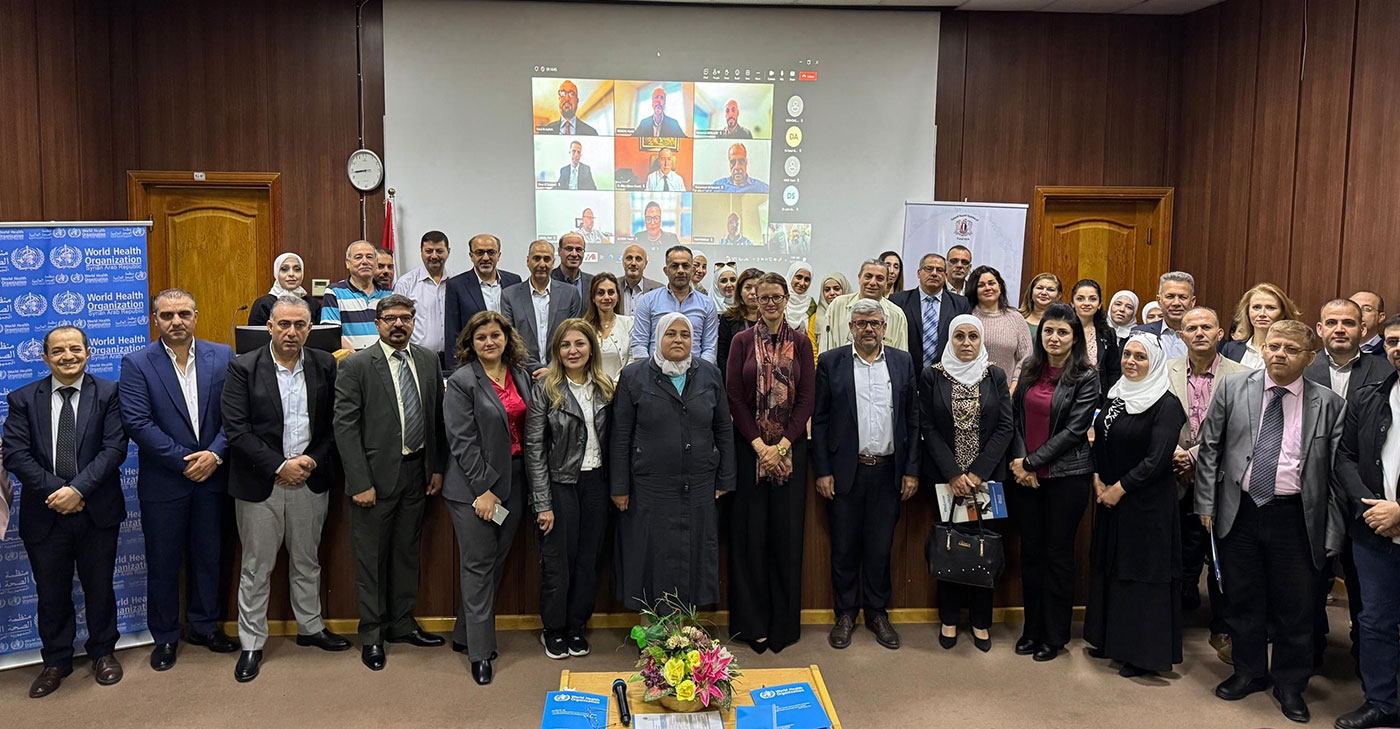 ToT programme to enhance hospital management and care across Syria.
ToT programme to enhance hospital management and care across Syria.
Photo credit: @WHO Syria-Bashar Sattari31 October 2024, – On 23 October 2024 the World Health Organization (WHO), in collaboration with Syria’s Ministry of Health, announced a comprehensive training of trainers (ToT) programme to enhance hospital management and care across Syria. The programme, which runs until mid-November at the Centre for Strategic Studies and Health Training in Damascus, will train 70 health professionals as national trainers.
Supported by Austria, the training will equip participants with leadership and management skills tailored to Syria’s healthcare needs. The initiative includes 7 modules covering: governance, leadership, and strategic thinking; human resource management; hospital financial management; quality improvement and patient safety; hospital supplies and supportive services; hospital emergency and disaster management and hospital information management.
The modules, incorporating global best practices, will be delivered by expert facilitators from WHO’s Regional Office for the Eastern Mediterranean (EMRO) and commissioned international consultants from the Arab world. This initiative has already been implemented in 6 countries in the Region.
Acting WHO Representative to Syria Ms Christina Bethke underlined the importance of the initiative: “This programme marks a significant step in empowering Syria’s health care leadership. By building the capacity of national trainers, we aim to ensure that hospital teams across the country are equipped with the needed tools and leadership skills to play a critical role in responding to and minimizing the impact of public health emergencies and humanitarian crises. By investing in the health workforce, we can support the early recovery of Syria’s health system.”
Dr Hamid Ravaghi, regional advisor at the Universal Health Services department in EMRO, stated: "The ToT program will play a pivotal role in creating a sustainable model for continuous training and professional development, empowering hospital managers to lead with strategic vision, ultimately improving healthcare services and enhancing responsiveness to the sector's evolving needs."
In addition to international experts, national facilitators will also participate, helping to ensure that local expertise is developed. The program will establish a network of trainers to roll out a capacity-building program in hospital management to benefit all public hospitals in Syria by the end of 2025.
WHO intensifies efforts to combat TB, HIV, and Leishmaniasis control in Syria
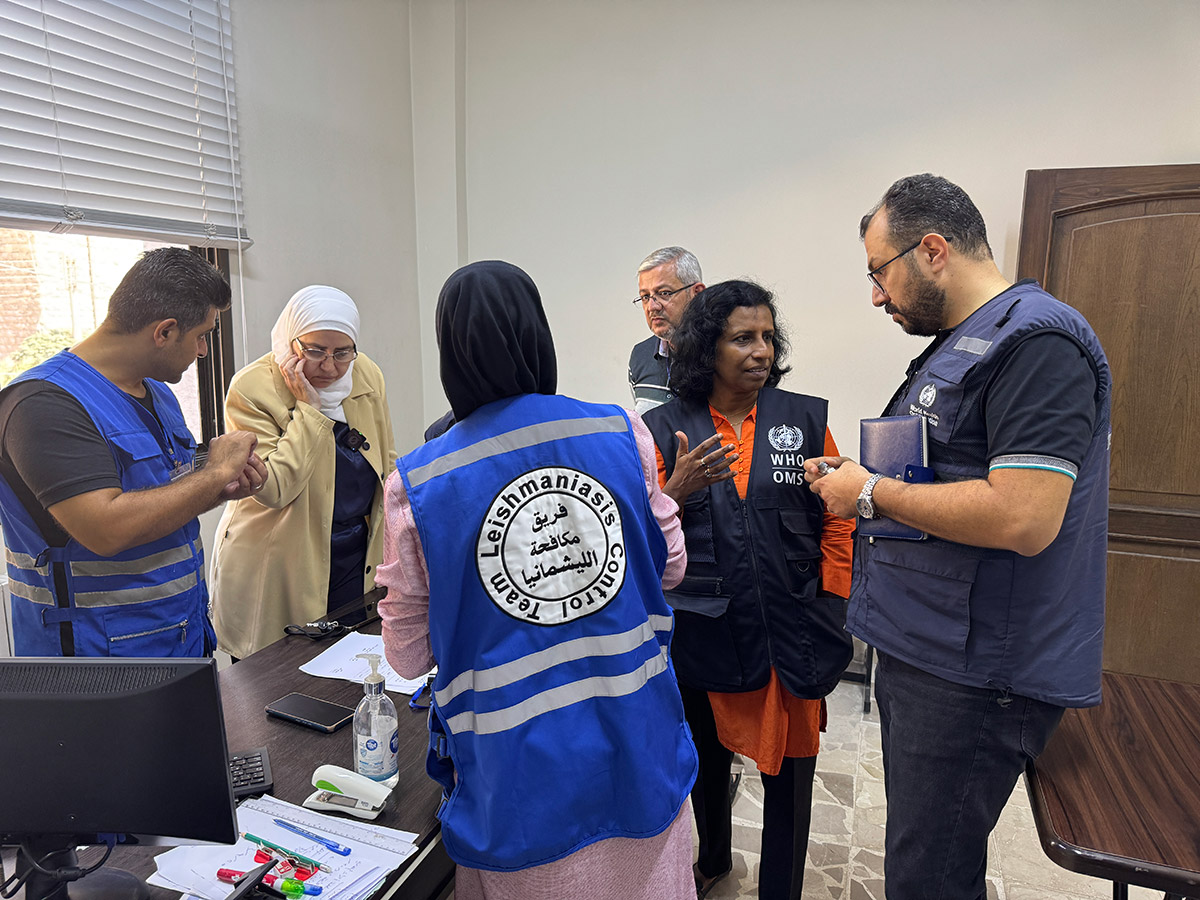 EMRO team visiting the newly established leishmaniasis treatment centre in Salah Al-Din, Aleppo, as part of WHO's efforts to expand healthcare access in Syria. Photo credit: @WHO Syria.24 October 2024 – On 3 October 2024, experts from the WHO Regional Office for the Eastern Mediterranean and the WHO Country Office concluded a mission in Syria to review, in collaboration with the Syrian Ministry of Health (MoH), the performance of the HIV, tuberculosis (TB), leishmaniasis and vector-borne disease control programs. The mission involved field visits to health facilities and directorates of health in Aleppo, Hama, Rural Damascus, and Damascus governorates to assess and evaluate the implementation and identify opportunities to expand access to quality health services and improve outcomes.
EMRO team visiting the newly established leishmaniasis treatment centre in Salah Al-Din, Aleppo, as part of WHO's efforts to expand healthcare access in Syria. Photo credit: @WHO Syria.24 October 2024 – On 3 October 2024, experts from the WHO Regional Office for the Eastern Mediterranean and the WHO Country Office concluded a mission in Syria to review, in collaboration with the Syrian Ministry of Health (MoH), the performance of the HIV, tuberculosis (TB), leishmaniasis and vector-borne disease control programs. The mission involved field visits to health facilities and directorates of health in Aleppo, Hama, Rural Damascus, and Damascus governorates to assess and evaluate the implementation and identify opportunities to expand access to quality health services and improve outcomes.
"Our goal is to ensure that communities in crisis have access to essential health services, especially for diseases worsened by conflict," said Dr Iman Shankiti, Acting WHO Representative to Syria. "Working with the Ministry of Health and partners, we are enhancing prevention, diagnosis, and treatment of TB, HIV, and leishmaniasis to better serve the most vulnerable."
Aleppo, home to nearly half of Syria’s leishmaniasis cases, is a key focus area. In collaboration with the MoH, WHO has opened a new treatment centre in Salah Al-Din and is upgrading the existing facility in Jab Al-Quba. Early detection and prompt treatment are central to WHO’s strategy, supported by vector control programs to reduce transmission.
With support from the Global Fund, WHO is working closely with the MoH to ensure that TB services are accessible, especially in remote and underserved areas. In Aleppo, WHO has helped rehabilitate the main TB centre, which supports 12 primary healthcare facilities and three laboratories across Aleppo and Rural Aleppo. A mobile TB clinic, one of five operating in Syria, serves displaced and vulnerable populations, reaching nearly 60,000 people each year.
WHO-supported voluntary counselling and testing centres provide free HIV services throughout Syria. In 2023, these centres conducted over 4,300 tests, identifying 45 positive cases. By early 2024, more than 440 people were receiving comprehensive care, including antiretroviral treatment (ARVs) and mental health and psychosocial support (MHPSS). All services are provided free of charge in all governorates through the MoH, also with Global Fund support.
With Syria’s healthcare system strained by the ongoing crises and displacement, WHO remains focused on delivering life-saving services for communicable diseases. This mission reflects WHO’s commitment to working closely with the Syrian Ministry of Health to expand access to care and improve health outcomes for those most in need.
Syria's hidden struggle: mental health in crisis
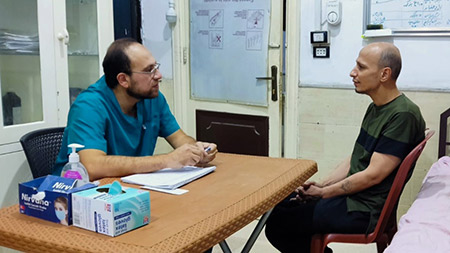 Caption 1: Dr. Ghazwan Bweedani at Azaz Mental Health Hospital with a patient.
Caption 1: Dr. Ghazwan Bweedani at Azaz Mental Health Hospital with a patient.
10 October 2024 – More than thirteen years of crises have taken a heavy toll on the health and well-being of Syria’s population, particularly its healthcare workers. On this World Mental Health Day, themed “Mental Health at Work,” WHO is highlighting the immense challenges faced by healthcare providers and patients across the country. Their stories reflect resilience in the face of hardship, set against a backdrop of dwindling resources and a health system stretched to its limits.
In Aleppo, Dr. Hiba Aubrey, an Ear Nose and Throat (ENT) doctor and head and neck surgeon, remembers the morning of 6 February 2023 as if it were yesterday. “At 4:17, we were jolted awake by strange noises and the ground was shaking beneath us,” she recalls. Leaving her family in what she hoped was a safe corner of their damaged home, she rushed to the hospital, where crowds of injured patients awaited care.
“Our duty was greater than our fear,” says Dr. Aubrey, reflecting on how she and her colleagues prioritized attending to patients despite constant concerns for their families' safety.
The earthquake shattered not only buildings but also lives, leaving deep emotional scars. The country has seen an 80% increase in depression and a 570% rise in stress-related disorders, along with higher mortality and morbidity rates linked to these conditions.
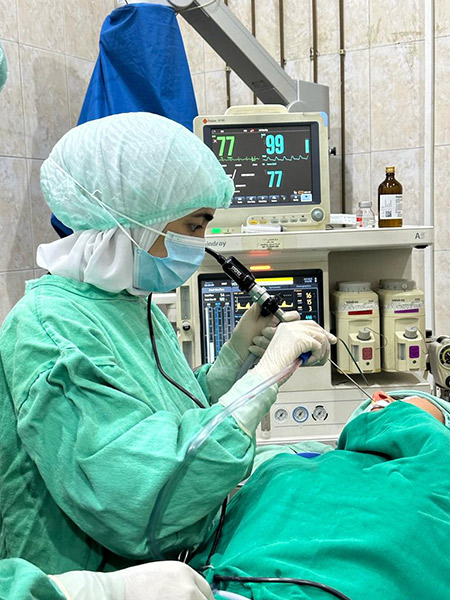 Caption 2: Dr. Hiba Aubrey, an ENT specialist, in an operating room in Aleppo.
Caption 2: Dr. Hiba Aubrey, an ENT specialist, in an operating room in Aleppo.
In northwest Syria, nearly 20% of the population — about 1 million people — live with mental health disorders. But in a region of 5.1 million people, only two psychiatrists and 78 trained doctors remain.
At Azaz Mental Health Hospital, psychiatrist Dr. Ghazwan Bweedani not only treats patients dealing with the mental toll of conflict but also feels its effects himself. The hospital, a critical resource for those suffering from chronic conditions like schizophrenia and bipolar disorder, is grappling with severe funding shortages. “So many of our services are in jeopardy,” explains Dr. Bweedani. “We can’t even pay rent for additional space, let alone ensure regular salaries for our staff. Patients are crowded into just one area.”
Despite these challenges, the hospital’s 35 staff members, many working without pay, continue to provide essential care to 25 to 30 outpatients daily. But due to the lack of funds, the hospital has been forced to cut back on critical services that help communities.
The theme of this year’s World Mental Health Day—Mental Health at Work—is particularly relevant in Syria, where healthcare workers like Dr. Aubrey and Dr. Bweedani must confront their own trauma while continuing to care for others. The constant strain has led to increasing burnout and stress among medical professionals, who often work beyond their shifts without adequate support.
“This is not just a health issue; it’s a protection issue,” Dr. Bweedani emphasizes, pointing to the broader risks that arise if healthcare facilities are forced to close due to lack of funding. The Azaz facility is on the brink of closure, potentially leaving thousands without access to care, further endangering those with severe mental health conditions and escalating the crisis.
While health workers across Syria continue to provide life-saving services, they do so in an environment where their own well-being is often overlooked, compounding the challenges of delivering care in a country that has suffered multiple crises.
WHO, in collaboration with the Ministry of Health and partners, is fully committed to improving access to mental health services for all those in need. Over the past two years, more than 1 million mental health consultations have been provided, demonstrating a strong effort to support the mental well-being of the Syrian people but more is needed to ensure healthcare workers themselves have the necessary space, supplies and salaries to continue providing their life-saving services.
Aleppo’s paediatric hospital revitalized and equipped
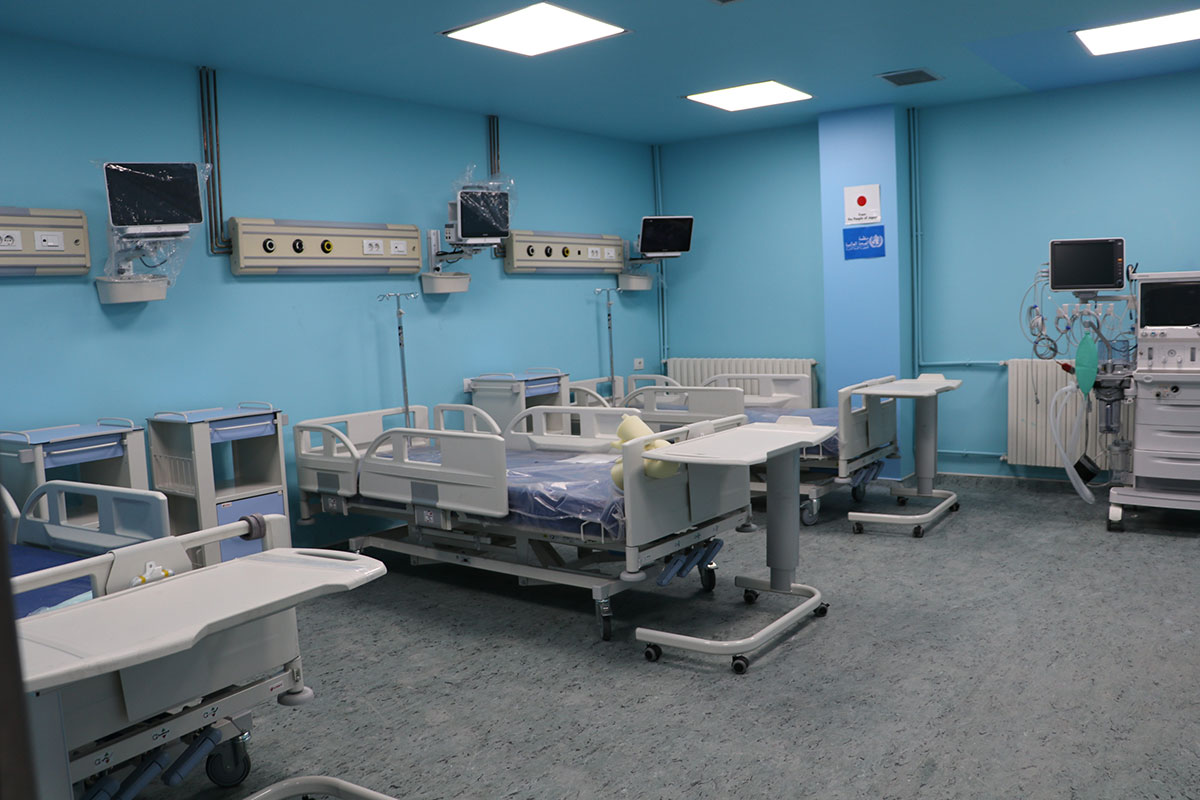 The newly equipped and renovated Intensive Care Unit at the Pediatric Hospital in Aleppo. Photo credit: @WHOSyria.9 October, Aleppo, Syria – The World Health Organization (WHO), in collaboration with the United Nations Development Programme (UNDP) and with funding from the People of Japan, has delivered essential medical equipment to the newly reconstructed Paediatric Hospital in Aleppo, Syria. The initiative marks a critical step in restoring secondary and tertiary health care services for children in Aleppo and surrounding regions. Following extensive rehabilitation by UNDP, the hospital, which was damaged during the Syrian conflict in 2012, is now fully equipped to provide comprehensive care to vulnerable children.
The newly equipped and renovated Intensive Care Unit at the Pediatric Hospital in Aleppo. Photo credit: @WHOSyria.9 October, Aleppo, Syria – The World Health Organization (WHO), in collaboration with the United Nations Development Programme (UNDP) and with funding from the People of Japan, has delivered essential medical equipment to the newly reconstructed Paediatric Hospital in Aleppo, Syria. The initiative marks a critical step in restoring secondary and tertiary health care services for children in Aleppo and surrounding regions. Following extensive rehabilitation by UNDP, the hospital, which was damaged during the Syrian conflict in 2012, is now fully equipped to provide comprehensive care to vulnerable children.
Advanced diagnostic imaging equipment delivered to the hospital includes CT scanners, digital X-rays and ultrasound devices, enabling precise, comprehensive diagnostics and follow-up measures. The hospital also features an 8-bed Intensive Care Unit (ICU) equipped to handle critical paediatric cases, and three fully equipped operating rooms with endoscopy surgical towers. In the paediatric ward, 45 incubators have been installed to provide specialized care for newborns, and the hospital now includes a fully operational haemodialysis unit for treating children with end-stage kidney failure. Three outpatient clinics provide oral health, ear, nose and throat and neurological services, including electroencephalograms.
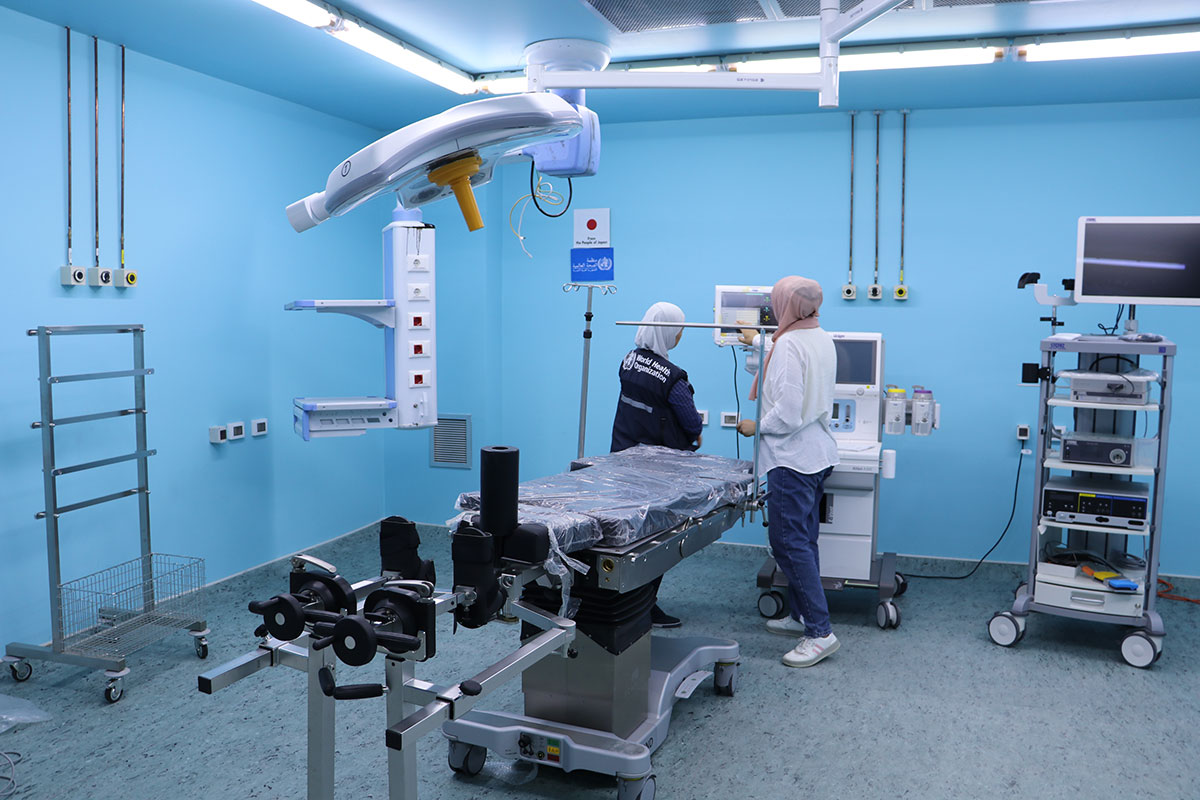 Two oxygen generators, three electric generators, a central sterilization unit, a kitchen and laundry units have been installed to ensure the hospital runs smoothly.
Two oxygen generators, three electric generators, a central sterilization unit, a kitchen and laundry units have been installed to ensure the hospital runs smoothly.
Underlining the importance of the project, acting WHO Representative to Syria, Dr Iman Shankiti, said: “Thanks to the support of the People of Japan, the reopening of this hospital brings vital secondary and tertiary health care services back to the community, ensuring that children receive the life-saving medical attention they need without having to travel long distances.”
The 70-bed capacity hospital will serve over 4 million people in eastern rural Aleppo and benefit children referred from neighbouring governorates, including Al-Hasakeh, Ar-Raqqa, and Deir-ez-Zor.
This generous contribution from the People of Japan bolsters WHO’s efforts to support Syria’s health system. The hospital’s revival not only improves access to health care but also restores hope for thousands of families who have struggled amidst adverse conditions, often forced to travel for long distances to seek treatment opportunities elsewhere.
Dedicated to improving health outcomes and alleviating the suffering of communities affected by the ongoing crisis, WHO continuously provides essential medical supplies, strengthens health care services, and ensures access to quality health care as part of its overall goal to ensure a resilient health system in Syria.
WHO secures US$ 5.5 million from CERF to boost emergency health response in Syria
6 October 2024 – The World Health Organization (WHO) welcomes the US$ 5.5 million funding received from the United Nations Central Emergency Response Fund (CERF) to enhance its integrated multisectoral emergency response in Syria. The funding will enable WHO to continue delivering life-saving healthcare services to the most vulnerable populations in conflict-affected regions of the country.
The support aims to reduce morbidity and mortality by ensuring access to essential health care, including advanced nutrition services, and by delivering health services to people in need in north-west Syria and north-east Syria, including sub-districts in Aleppo, Al-Hasakeh, Dar’a, Deir-ez-Zor, Idleb and Lattakia.
“We are grateful for CERF’s continued support in addressing urgent health needs in Syria, particularly in this critical time where needs are increasing day-by-day” said Dr Iman Shankiti, acting WHO Representative to Syria. “The funding will enable WHO to restore and strengthen critical health care services and respond to severe malnutrition cases in the most hard-to-reach and underserved areas of the country.”
The funding will support an estimated 1.8 million people in prioritized areas, aiming to improve access to primary and secondary health care, bolster emergency referral systems – with a focus on children with malnutrition, provide essential supplies to nutrition stabilization centres and hospitals, and strengthen the capacity of local health care workers on mental health, gender-based violence, and communicable diseases.
“The greatest strength at WHO is our ability to reach people in need, no matter how remote or challenging the circumstances. We are thankful to CERF for enabling us to cover critical gaps in the healthcare system in north-west Syria, where we often must make painful decisions to prioritize the most vulnerable,” said Ms Rosa Crestani, Head of Office, WHO Gaziantep in Türkiye.
Through this generous contribution, WHO, in collaboration with local health authorities and NGOs, will address the immediate health needs of communities across Syria - including internally displaced persons, returnees, and other vulnerable group. This comprehensive response will save lives and help stabilize healthcare systems in the areas most affected by the ongoing conflict and the worsening situation in Syria.
Throughout WHO’s response, the funding will also be utilized to build local capacities through risk communication and community engagement (RCCE) activities and tackle sexual exploitation and abuse, helping to ensure that protection and accountability remain central to the humanitarian response.
Jehan's story: the life-changing impact of timely medical care during conflict
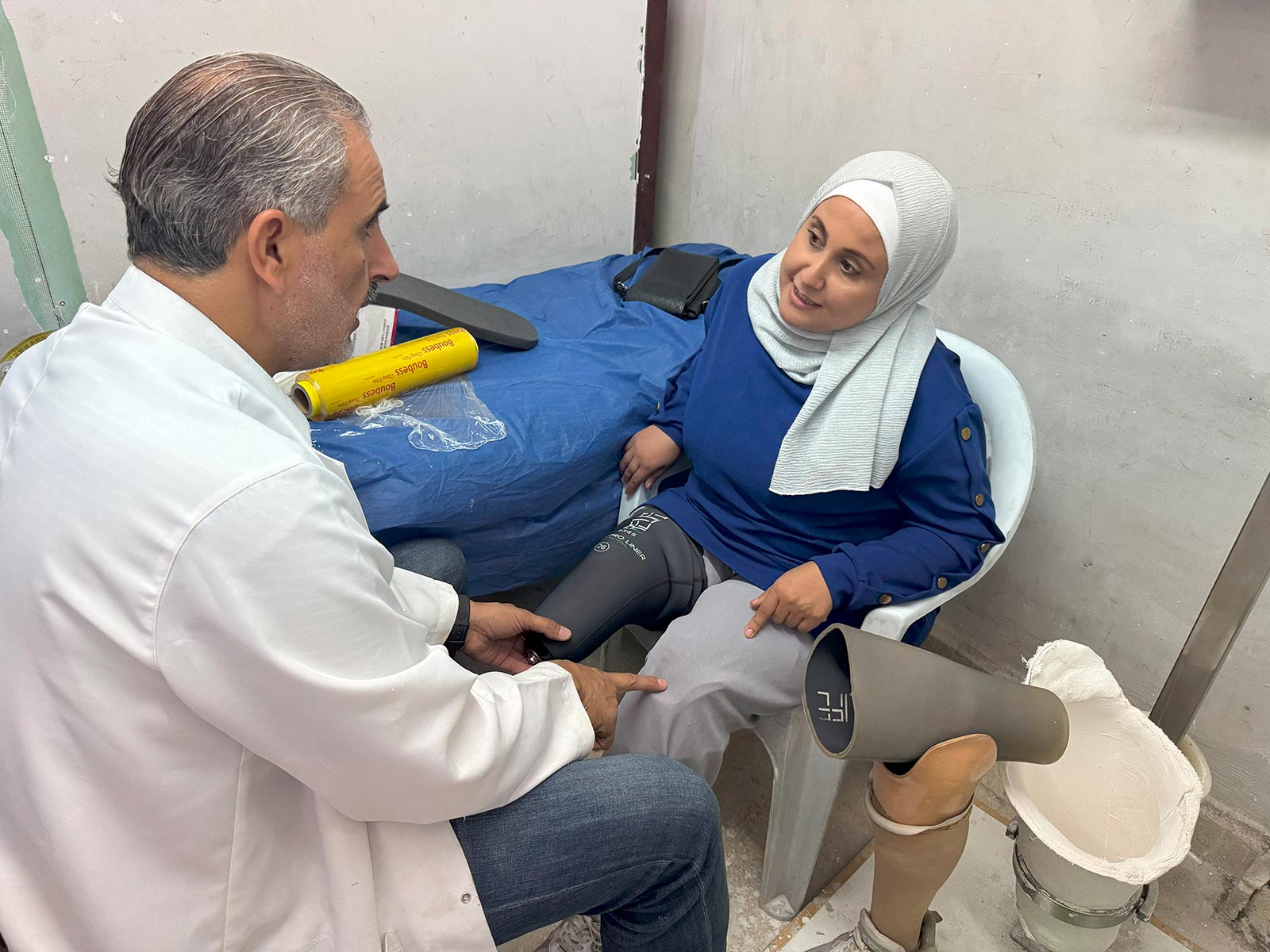 Jehan receiving free maintenance for her artificial limbs at the Rehabilitation and Artificial Limbs Centre. Photo credit: WHO Syria.17 September 2024, Damascus, Syria – Improving Diagnosis for Patient Safety, the theme of this year’s World Patient Safety Day – observed annually on 17 September – calls global attention to the critical need for timely and accurate medical care. It is a message that resonates deeply in conflict-affected Syria.
Jehan receiving free maintenance for her artificial limbs at the Rehabilitation and Artificial Limbs Centre. Photo credit: WHO Syria.17 September 2024, Damascus, Syria – Improving Diagnosis for Patient Safety, the theme of this year’s World Patient Safety Day – observed annually on 17 September – calls global attention to the critical need for timely and accurate medical care. It is a message that resonates deeply in conflict-affected Syria.
The experience of Jehan, a 38-year-old woman from Al-Dhiyabiya in Rural Damascus, provides a reminder of the devastating consequences of delayed care. Jehan’s life changed in 2012 when conflict reached her neighbourhood. Returning home to retrieve essential items for her children, Jehan was severely injured by a shell. When she finally reached Al-Mouwasat Hospital in Damascus the doctors who examined her had no choice but to amputate both her legs.
"I spent two months in the hospital, grappling with the physical and emotional trauma of losing my legs. To make matters worse, my husband went missing and I haven’t heard from him since. The transition from being an active mother and wife to someone who needed constant help was incredibly difficult," said Jehan.
During her treatment at Al-Mouwasat Hospital, the possibility of prosthetic limbs was mentioned and Jehan received a referral to the WHO-supported Rehabilitation and Artificial Limbs Centre in Damascus. Overwhelmed by despair at her situation, Jehan didn’t visit the Centre until 4 years later when, with her family's support and accompanied by her mother, she finally went.
"The doctors were extremely supportive. They immediately took measurements for my prosthetics, which were provided free of charge and fitted within a week. I received a month of training at the Centre on how to walk with my new limbs," said Jehan.
Dr Iman Shankiti, acting WHO Representative to Syria, highlighted the importance of WHO support for the Centre since 2015, stating: "WHO’s continued assistance to the Rehabilitation and Artificial Limbs Centre is essential, especially as the crisis increases demand. Psychosocial support is also crucial to provide comprehensive care for these patients”.
Today, Jehan leads a more independent life. She works at a bag-printing shop to support her children and says she feels "an empowered woman again”.
Head of the Rehabilitation and Artificial Limbs Centre Dr Rafif Dahia said: “Our centre has become a lifeline for Syrians with disabilities. We've grown from treating 15 patients a month in 2001 to managing 50 to 60 cases today. All services are provided free of charge”.
In 2023, WHO’s support helped over 1350 people receive prostheses and 640 staff members were trained or retrained to ensure continuation of this essential work.
Jehan's story is a testament to the resilience of the human spirit and the power of timely medical care. As we observe World Patient Safety Day 2024, Jehan’s journey from injury to recovery serves to underline the critical role that access to health care and accurate diagnosis play in preventing lifelong disability.
Thaer Al-Ali: nursing on the frontline
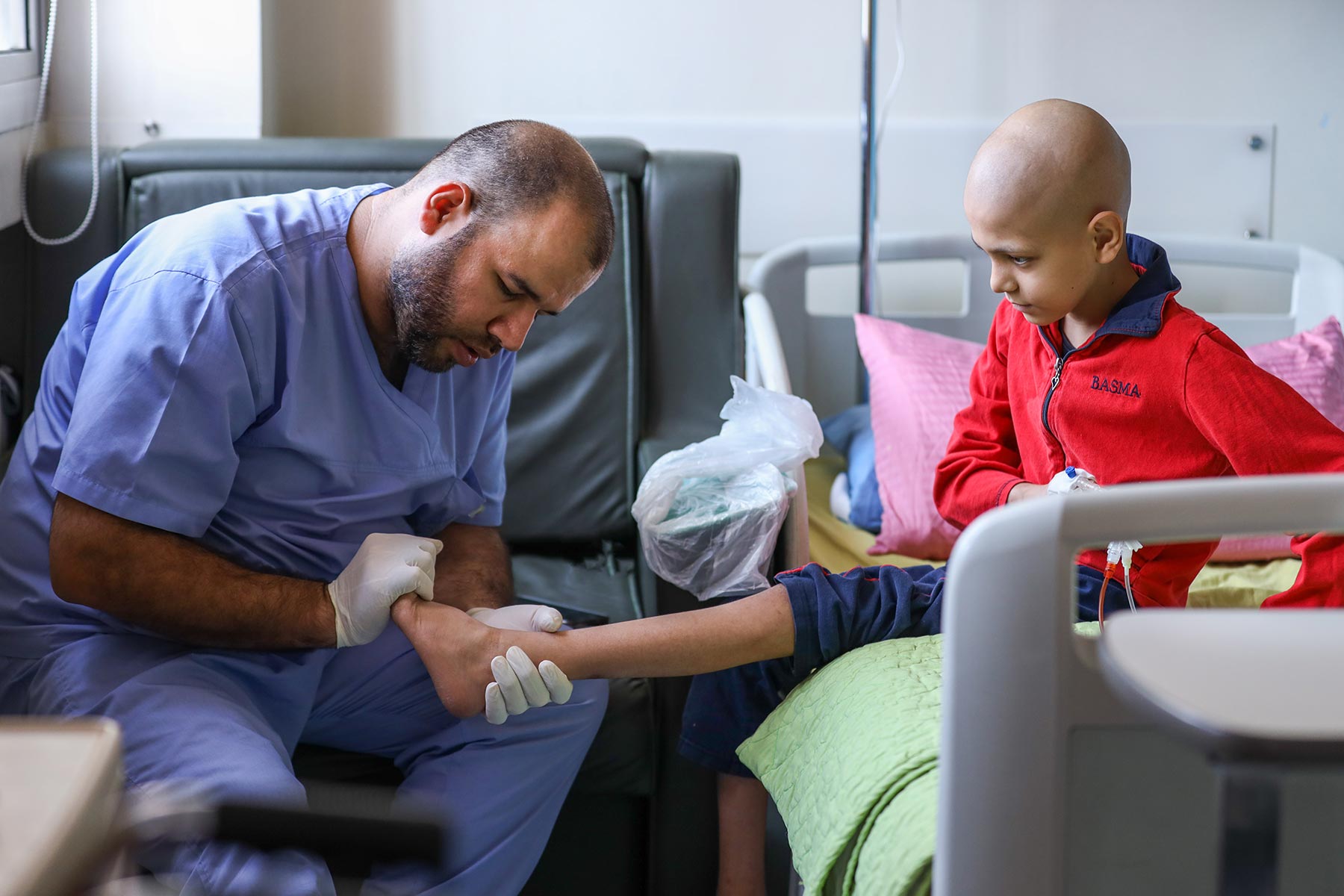 Photo caption: Thaer Al-Ali at BASMA Association in Rural Damascus, Syria providing healthcare for a young cancer patient. 1 September 2024, Damascus, Syria –Thaer Al-Ali is a nurse at the BASMA Association in Syria’s Rural Damascus governorate. He is part of a team caring for children with cancer.
Photo caption: Thaer Al-Ali at BASMA Association in Rural Damascus, Syria providing healthcare for a young cancer patient. 1 September 2024, Damascus, Syria –Thaer Al-Ali is a nurse at the BASMA Association in Syria’s Rural Damascus governorate. He is part of a team caring for children with cancer.
“Every day starts early. By the time I arrive at work the weight of the day’s responsibilities are already pressing on me. The first task is a debriefing meeting with colleagues during which we discuss the patients’ conditions and treatment plans. We care for children with life-threatening illnesses and the meeting is crucial to prepare for the day ahead.
“I witness heart-wrenching cases. We provide both medical care and emotional support for patients and their families.
“Few people understand the dangers health care workers face in Syria. Sometimes we risk our lives to do our jobs.
“Between 2014 and 2018 I used to commute to Al-Biruni University Hospital in Harasta, one of Rural Damascus’s more dangerous areas. Each day I had to decide whether I would stay home, in which case I would have been neglecting my patients, or risk my life by going to work, fully aware of the dangers posed by snipers and gunfire. Sadly, it was common to hear about colleagues being injured or killed while commuting to or from the hospital. Every morning, I felt uncertain. Yes, I might make it to work today but tomorrow could be a different story.
“Despite the constant fear, we never stopped. I was there to assist the patients, especially the children, overcome their illnesses. It was their courage, their smiles, their simple words of ‘thank you’ that helped me through the tough times. The atmosphere was emotional, filled with reassurance and love. Losing a child during treatment is like losing part of your soul.
“I remember taking a young girl to surgery. Her mother, who was at the hospital entrance, was hit by shrapnel from a mortar. We were shocked to see the mother being rushed in instead. Thankfully, both the girl and her mother survived. These are the stories we lived through.
“Today, the situation in Syria has improved but the economic crisis is severe. Many people struggle to afford the basics needed to survive. I am grateful that we can provide free treatment, supported by health partners like WHO.
“Being a nurse in Syria is more than a profession, it is a mission to bring hope and healing to those in need, no matter the circumstances. We are defined by our dedication, which drives us every day in this resilient nation where hope is often the only medicine on offer.”
Abu Sary’s lifelong dedication to immunization
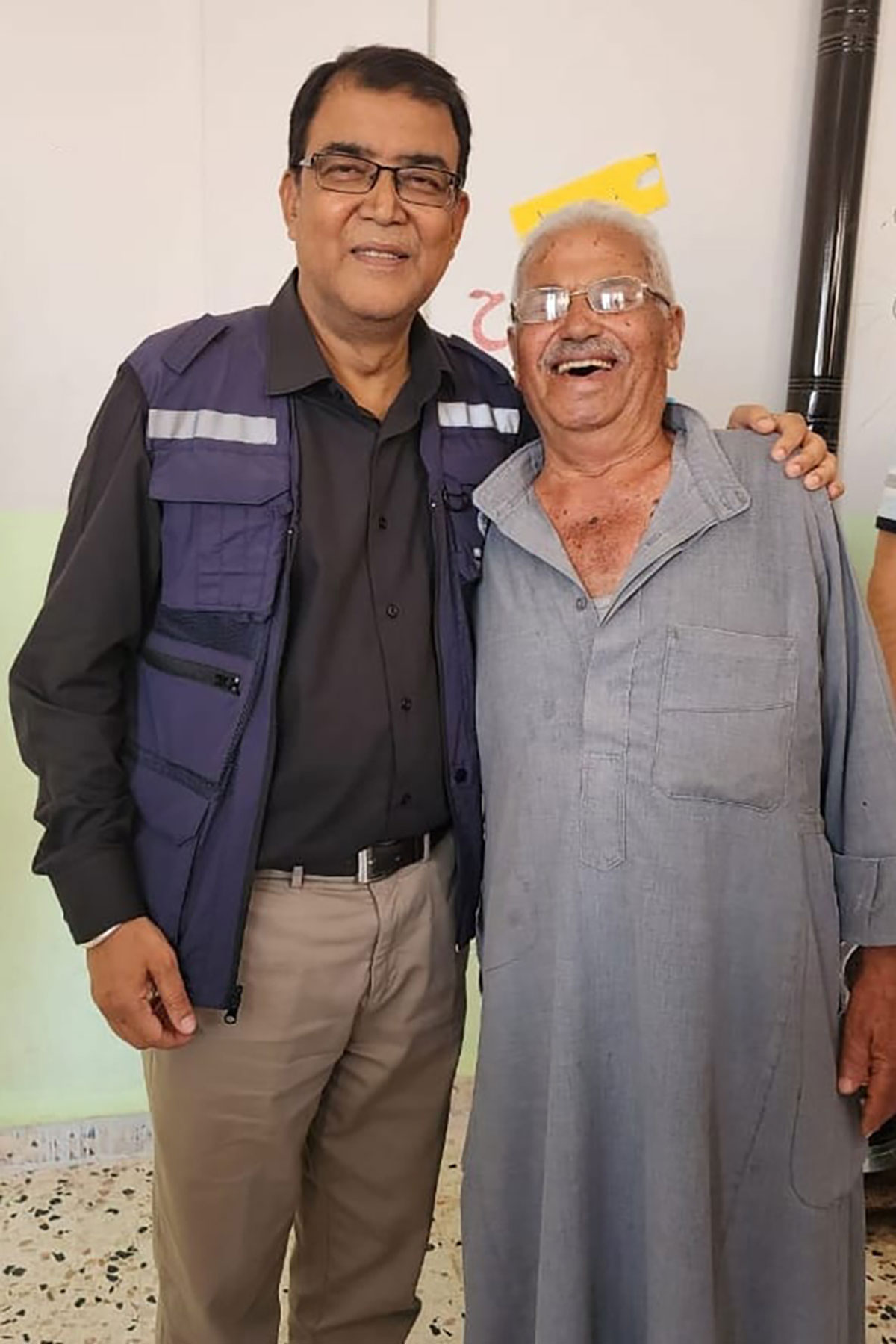 Abu Sary is pictured with WHO staff in July 2024 during the 2nd round of the Big Catch-up vaccination activity in Al-Saan health center, Suqaylabiyah, Hama Governorate.27 August 2024, Damascus, Syria – On 28 May 2024, delegates of the Seventy-seventh World Health Assembly took part in a special high-level event to celebrate 50 years of immunization progress – honouring achievements, embracing innovation and envisioning the future. The event was to commemorate the 50th anniversary of the Expanded Programme on Immunization (EPI).
Abu Sary is pictured with WHO staff in July 2024 during the 2nd round of the Big Catch-up vaccination activity in Al-Saan health center, Suqaylabiyah, Hama Governorate.27 August 2024, Damascus, Syria – On 28 May 2024, delegates of the Seventy-seventh World Health Assembly took part in a special high-level event to celebrate 50 years of immunization progress – honouring achievements, embracing innovation and envisioning the future. The event was to commemorate the 50th anniversary of the Expanded Programme on Immunization (EPI).
As WHO marks this milestone, it is important to acknowledge the health worker heroes who have worked tirelessly to protect public health. One such hero is Abu Sary, from Salamiyah, Hama, Syria. His lifelong dedication to vaccinating the children of Bedouin tribes has significantly improved health in his community.
Born into a Bedouin family, Abu Sary has always understood the unique challenges of his people. After graduating in 1967, Abu Sary joined the health department in Salamiyah. His purpose was clear: to bring to the nomadic Bedouin families the essential health services they often missed out on.
From 1967 to 2004, Abu Sary worked with mobile vaccination teams. He educated Bedouin families about the importance of vaccination, facilitated their access to public services and earned their trust. This trust was crucial to his mission to ensure that children received the essential vaccinations they needed.
Abu Sary consistently went above and beyond his duties. Each week, he would travel with mobile vaccination teams to Bedouin areas on Saturdays, Sundays and Mondays, often staying overnight to ensure that all vaccines were administered. On Monday evenings, he returned to Salamiyah to refill his car with fuel and collect more vaccines, before continuing to visit different Bedouin areas until Thursday. His commitment to working away from home showed his deep dedication to the health of the Bedouin people, who trusted him as one of their own.
After retiring in 2004, Abu Sary remained an influential figure in vaccination promotion in Salamiyah and the surrounding deserts of Hama, Homs and Ar-Raqqa. For many years, he continued to know the vaccination status of every Bedouin child, and he would help mobilize community members for vaccination activities.
In 2024, Abu Sary supported the Big Catch-Up vaccination activities conducted in April and July, which reached and screened the vaccination status of more than 26 000 children aged under 5 years across Syria. His efforts directly helped to vaccinate more than 160 zero-dose children in the Salamiyah area, most of them living in remote and high-risk areas.
Today, Abu Sary’s daughter is pursuing a career in health care that involves administering vaccinations, inspired by her father’s commitment to the cause. His enduring influence ensures that his mission to protect public health continues.
Abu Sary’s efforts have saved numerous lives, and his story exemplifies how one individual can truly make a difference through commitment and service. Abu Sary is not only a health worker, but also an immunization hero.
Emad Shehab: dedicated colleague remembered for his service
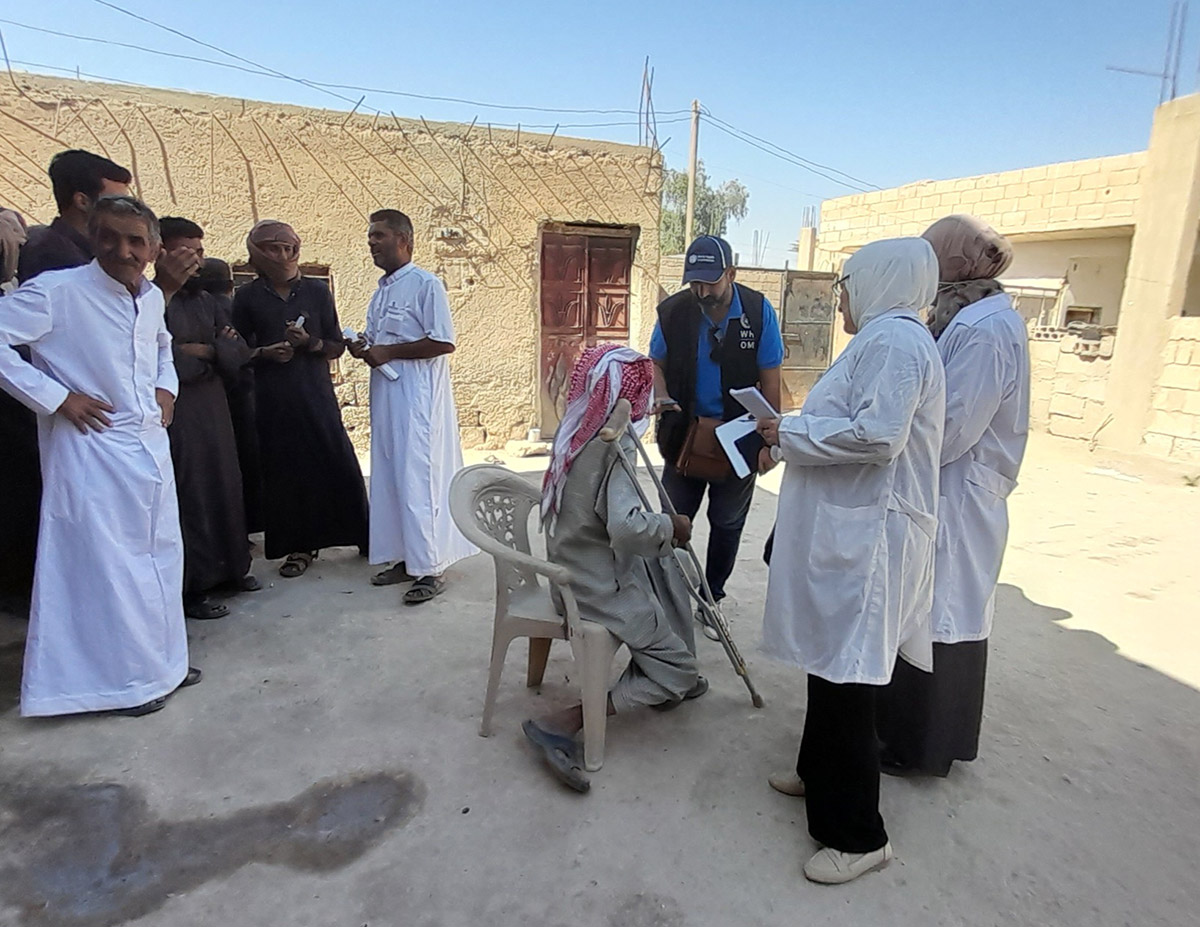 Photo caption: Emad Shehab actively engaging with community members during a cholera awareness campaign in Al-Ashara, Deir-ez-Zor Governorate, Syria, 2023. Photo credit: @WHO
Photo caption: Emad Shehab actively engaging with community members during a cholera awareness campaign in Al-Ashara, Deir-ez-Zor Governorate, Syria, 2023. Photo credit: @WHO
19 August 2024, Damascus, Syria – Emad Shehab, killed after a building collapsed following an airstrike in his hometown Deir-ez-Zor, was a public health emergency specialist and engineer whose expertise and dedication served as an inspiration to everyone who worked with him.
"Emad was a dedicated professional whose commitment greatly impacted our response in Syria. We deeply feel his loss, and his legacy continues to inspire our work. We are committed to carrying on the vital work he championed and honouring his memory,” said Dr Iman Shankiti, WHO Representative a.i in Syria.
Emad started working at WHO in 2022 as a water, sanitation and hygiene (WASH) focal point in Deir-ez-Zor. His expertise led to critical improvements in WASH conditions at health facilities where he spearheaded vital water quality monitoring efforts and addressed significant public health hazards. Imad’s leadership in installing solid waste treatment units at Al Assad Hospital and Al-Hamidiya Health Centre was crucial in mitigating epidemic risks, making significant contributions to public health and environmental safety in challenging circumstances.
"Emad was a loving and caring husband and father of two children, Jad, 4, and Sham, 9. Even now Jad asks me 'when will Dad come back from his trip? I miss him so much,' and I don't know how to reply," says Imad's widow Om Jad.
"My daughter Sham had a special relationship with her father. She watched him prepare blueprints for projects and she started to draw sketches of his work. He always supported and guided her. Now that he has passed away, she wants to be like her dad when she grows up so he can be proud of her."
Emad earned a bachelor’s degree in architectural engineering from Aleppo University in 2004. Before joining WHO, he gained extensive experience in engineering and project management, working with FAO, WFP, UNICEF and several NGOs on the construction and rehabilitation of water stations and sanitation facilities.
Emad showed unwavering devotion to his work and his family. His exemplary approach to humanitarian work and human relationships left a lasting impact on everyone he encountered, whether acquaintances or strangers. As Imad’s dedication and compassion continue to inspire us, we will honour his memory by carrying forward the vital work he was so passionate about. His loss is deeply felt by all of us who were fortunate enough to know him.
Large-scale scabies response in north-west Syria targets 71 camps and 7 communities
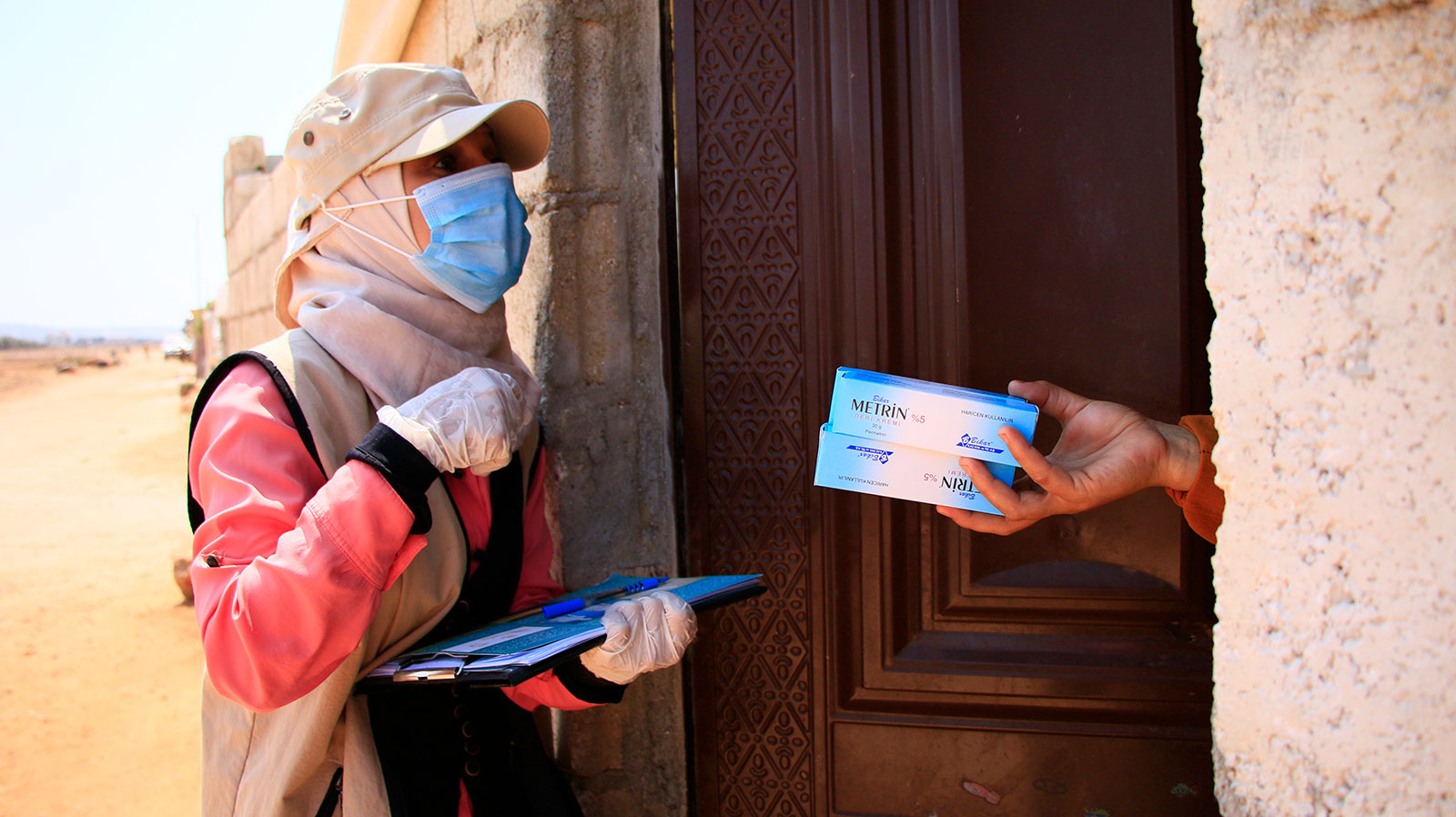 Door-to-door distribution of permethrin cream in camps as part of the scabies response in north-west Syria. Photo credit: © Al-Sham Humanitarian Foundation 4 August 2024 – In north-west Syria, lack of sanitation services, compounded by limited water supply and overcrowding, creates the ideal conditions for infectious diseases to spread. Scabies is among the infections of concern in north-west Syria, especially in densely populated camps as it is transmitted person to person through close skin contact.
Door-to-door distribution of permethrin cream in camps as part of the scabies response in north-west Syria. Photo credit: © Al-Sham Humanitarian Foundation 4 August 2024 – In north-west Syria, lack of sanitation services, compounded by limited water supply and overcrowding, creates the ideal conditions for infectious diseases to spread. Scabies is among the infections of concern in north-west Syria, especially in densely populated camps as it is transmitted person to person through close skin contact.
WHO collaborated with the United Nations Children’s Fund (UNICEF) and Health and WASH (Water, Sanitation and Hygiene) Cluster partners to launch a permethrin-based mass drug administration on 16 July 2024. This large-scale response to scabies has been made possible thanks to financial support from European Union Humanitarian Aid.
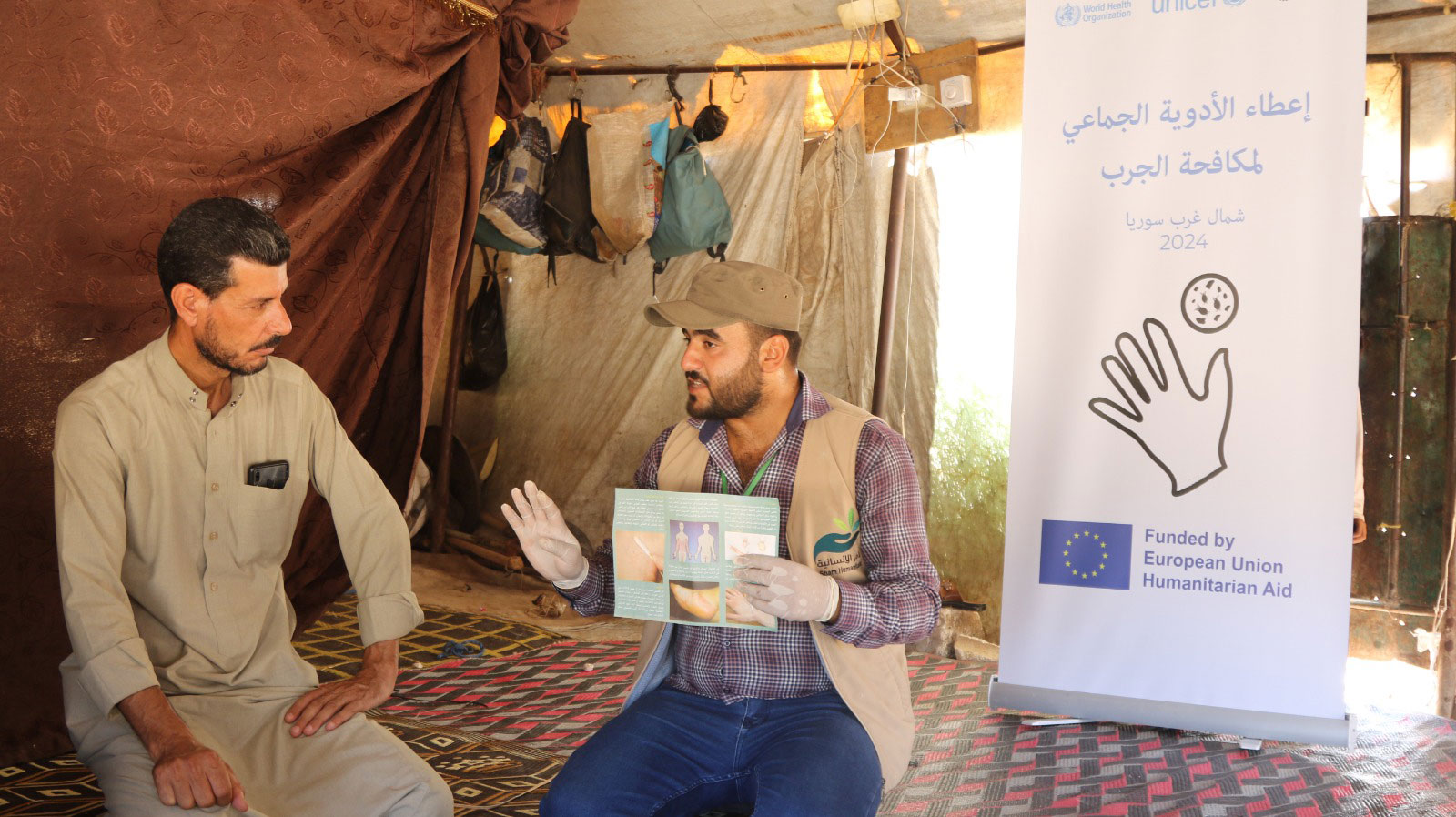 Community health workers raise awareness among families living in camps on how to treat and prevent scabies. Photo credit: © Al-Sham Humanitarian Foundation The campaign will last for 21 days and target more than 180 000 people in 71 camps and 7 communities. Partners have also distributed UNICEF-procured hygiene kits and trained community workers and hygiene promoters in how to treat scabies and prevent its further spread.
Community health workers raise awareness among families living in camps on how to treat and prevent scabies. Photo credit: © Al-Sham Humanitarian Foundation The campaign will last for 21 days and target more than 180 000 people in 71 camps and 7 communities. Partners have also distributed UNICEF-procured hygiene kits and trained community workers and hygiene promoters in how to treat scabies and prevent its further spread.
“In north-west Syria, an estimated 2 million people are living in overcrowded camps with poor living conditions. This presents a huge risk for the spread of scabies. We are very grateful to the European Union for its support in helping to curb the spread of scabies through this mass drug distribution,” said Ms Rosa Crestani, Team Lead for the WHO Field Presence Office in Gaziantep, Türkiye.
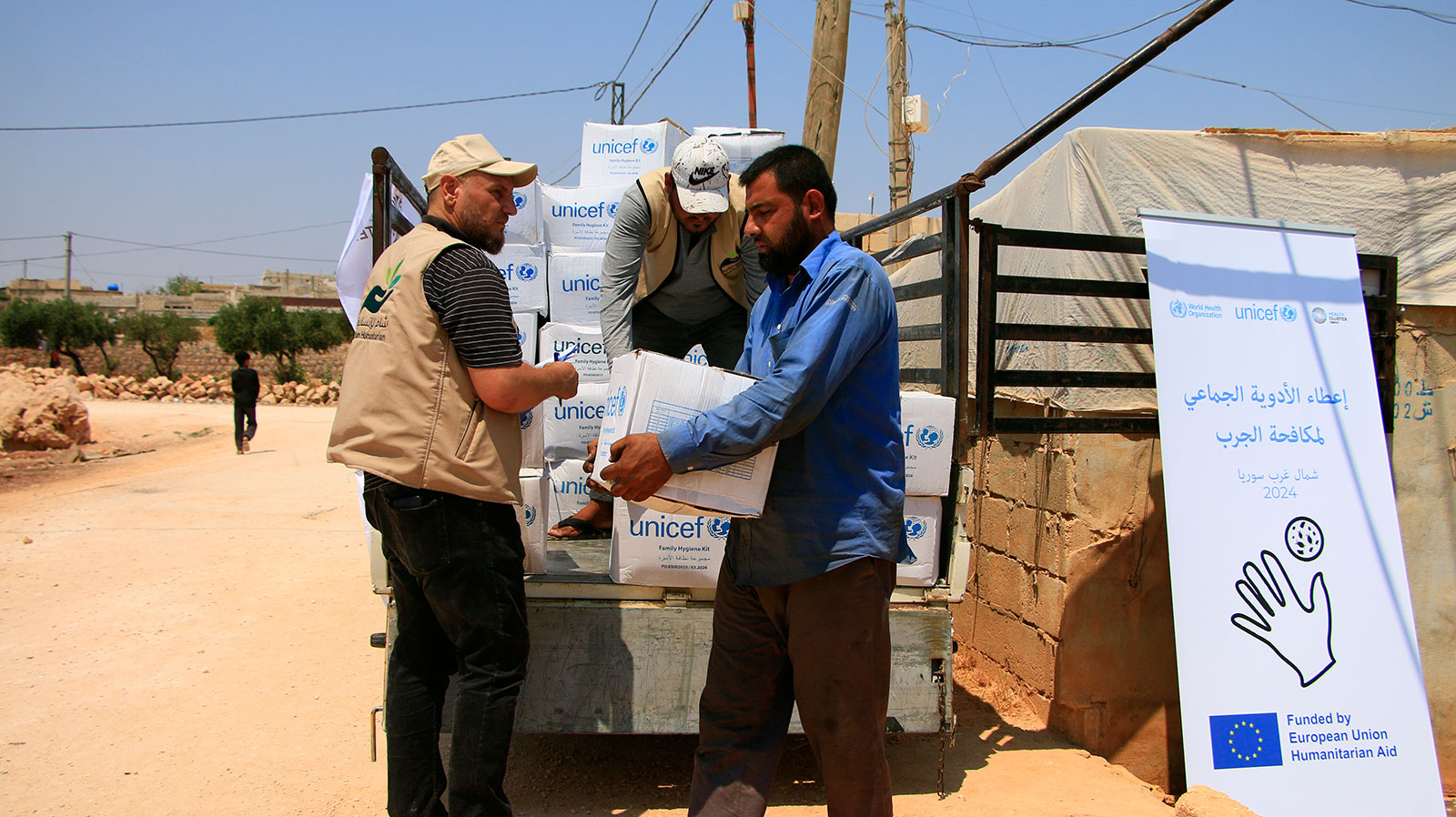 UNICEF-procured hygiene kits are distributed as part of the scabies response in north-west Syria. Photo credit: © Al-Sham Humanitarian Foundation WHO carried out a comprehensive scabies community survey exercise in north-west Syria in December 2023. This revealed a high prevalence of scabies, surpassing the 10% community transmission threshold set by WHO, with higher rates reported in camps.
UNICEF-procured hygiene kits are distributed as part of the scabies response in north-west Syria. Photo credit: © Al-Sham Humanitarian Foundation WHO carried out a comprehensive scabies community survey exercise in north-west Syria in December 2023. This revealed a high prevalence of scabies, surpassing the 10% community transmission threshold set by WHO, with higher rates reported in camps.
People living in camps were found to be 7 times more likely to contract scabies than people living in the wider community. Children and elderly people living in resource-poor areas and people with compromised immune systems are at higher risk of infection.


